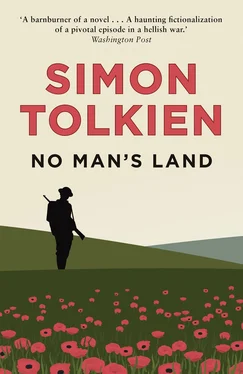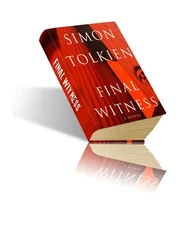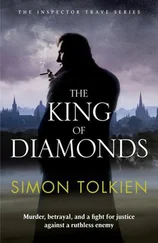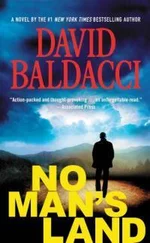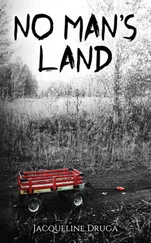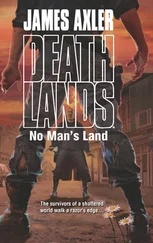‘It’s all right,’ said Adam. ‘Thank you for helping me today. I won’t forget it.’ The bus had arrived while they were talking and he reached over and shook Ernest’s hand before he got on. He meant what he’d said – it was a long time since he’d felt he had a friend.
On Sunday Daniel took his son to church. Adam was surprised. He vividly remembered the division in the house in London between his mother’s devout Christianity at one polar opposite and his father’s outspoken atheism at the other. According to Daniel there couldn’t be a God who would allow the world he’d created to be so unfair, so cruel to the vast majority of those who had the misfortune to be born into it. And since his mother’s death Adam had been inclined to agree with his father. The God to whom he had once prayed to find his father work and watch over his family seemed like a foolish figment of his childhood imagination, a cardboard cut-out figure with his big white beard and all-seeing eyes.
‘Why are we going, Dad?’ he asked as they walked up the hill together in the cold bright morning, leaving the mine and the streets of grey terraced houses behind them.
‘Because your mother would have wanted it,’ said Daniel. ‘It’s one of the only ways we can honour her memory.’
Adam nodded, accepting the explanation. ‘Does Edgar know we’re going?’ he asked. Like many of the miners, Daniel’s cousin was not a religious man. Church for him was where the owners and the managers went: its doctrines of social respect and obedience were useful tools to buttress their control of the workforce.
‘Yes, he knows. And he understands why,’ said Daniel. But Adam sensed an unease in his father’s voice that belied the certainty of his response.
The church was beautiful. It was smaller and simpler in design than the church in Islington, made of an old silvery-grey stone that was cold to the touch. There was no stained glass and the morning light poured in through the high leaded windows of the clerestory. The brick floor of the nave was uneven, worn down by centuries of use, and the carvings on the oak-wood chancel screen were primitive and mysterious – flat ancient faces with thin mouths and opaque eyes. The building was timeless, far removed from the ugly excrescence of the mining town stretching out behind it down the hill.
It was a family church built and maintained through the centuries by the Scarsdale family. Their huge marble mausoleum surrounded by iron railings and encrusted with black names and dates dominated the churchyard; and inside, a baroque tomb of two seventeenth-century ancestors carved in relief, lying side by side on a stone bed in the south transept, struck the only unharmonious note in the church’s architecture.
The empty front pew was reserved for the present occupants of Scarsdale Hall who had not yet arrived when Daniel and Adam took their seats at the back of the church. They came in just before the service was about to start: the father, a straight-backed, thin-faced man in his fifties with a long aquiline nose and a short clipped grey beard and moustache, was dressed in the severe formal fashion of thirty years before, and had on his arm a younger wife, who moved slowly up the aisle, her movement sharply constricted by a wasp-waisted hobble skirt that reached narrowly down to her ankles. The wilting sleeves of her silk blouse dripped with expensive lace and a wide-brimmed hat covered with artificial flowers was perched on the front of her head at just the right angle to show off her conventionally pretty face.
They were an ill-assorted couple, Adam thought: the husband making no effort at ostentation and the wife self-consciously fashionable and excessively over-dressed for the simple country setting. And behind them came their younger son, Brice, a boy of Adam’s age in an expensive suit with a carnation in his buttonhole and a gold-topped walking cane and pearl-grey silk hat in his hand. He looked very like his mother and yet he hadn’t inherited her good looks. The slightly drooping edges of her full mouth conveyed an impression of sensuality but the same feature on her son gave him a look of bored condescension, and while her dimpled chin was pretty, his small version made him seem weak and petulant.
Adam liked the parson, Mr Vale. He seemed down-to-earth and preached an inclusive gospel based on the second commandment, although there were precious few miners there to hear him. They were either Methodists attending the chapel on the other side of the valley or non-believers like Edgar, who saw the sabbath as an opportunity to catch up on sleep after the heavy demands of the working week. None of the family had been out of bed when Daniel and Adam had left for church in the morning.
The parson was waiting at the lychgate in his surplice with his daughter beside him when the congregation came out after the service. She was the most beautiful girl Adam had ever seen; she stopped him in his tracks at the door of the church, staring at her wide-eyed over the gravestones. She was dressed in a plain black dress with lace-up Oxford shoes and a bonnet. Nothing special, nothing fancy – just dark liquid eyes and rich dark hair and skin like white honey and a way of looking about her that seemed shy and tender all the same time. Adam thought that if he had been asked to write down every feature of the perfect female face then each one would have been hers, and yet he had never imagined her face in any of his dreams.
He stayed just outside the porch feasting his eyes on her, memorizing her, and prayed that she wouldn’t look back in his direction. He didn’t want to embarrass her but he didn’t want to stop watching her – the way she bent her slender neck forward to listen to her father, smiling in a way that lit up her face from inside as he spoke to the parishioners passing through the gate. And she didn’t notice him, didn’t feel his gaze. Someone else did instead – the owner’s son, Brice Scarsdale, the boy with the gold-tipped cane and the weak chin. He’d been standing watching the girl too and now he realized suddenly that she had another admirer.
He left his parents and came over to Adam. ‘What’s your name?’ he asked angrily, twirling his stick.
‘Adam Raine,’ said Adam evenly. ‘What’s yours?’
‘Never mind that. Don’t you know it’s rude to stare at a lady?’ Brice demanded angrily.
‘Yes,’ said Adam, looking him in the eye. ‘But you were doing the same.’
‘How dare you!’ said Brice. ‘Why, I’ve half a mind to—’ He raised the stick but then dropped it, remembering where he was. ‘You should learn some respect for your betters,’ he said and turned abruptly on his heel, walking quickly over to his parents, who were at that moment climbing into their chauffeur-driven motor car. And as they were driven away, Adam had the exquisite pleasure of being introduced to the parson’s daughter. Miriam was her name and she smiled at him as he took her hand.
In the afternoon there was a visitor at the house in Station Street. Luke Mason, the boy who’d spoken to Adam after the fight, was at the door holding a football under his arm.
‘Do you want to play, Ernest?’ he asked. ‘It’s a fine day. An’ thy friend can come too if ’e wants,’ he added, nodding to Adam.
Adam did want to; he could think of nothing that he wanted to do more, in fact. Days sitting on the bus or in classrooms had left him pent up with nervous energy. And he liked football. It had been one of the street games he’d played growing up, although the makeshift balls they’d used had been nothing like the heavy dark brown leather object that Luke was carrying.
What’s it made of?’ Adam asked.
‘It’s a rubber bladder inside an’ then tanned leather on top, eighteen sections of it all stitched together. Look, you can see the seams: it’s beautiful work,’ said Luke, holding the ball out for Adam to inspect. ‘Our team won it two year ago when we won the Mines Cup. Not the proper one, mind, but the one for kids our age. ’Twas the match ball an’ we won in the last minute. It was a great day, weren’t it, Ernest?’ said Luke with a faraway look in his eye, remembering past glory.
Читать дальше
